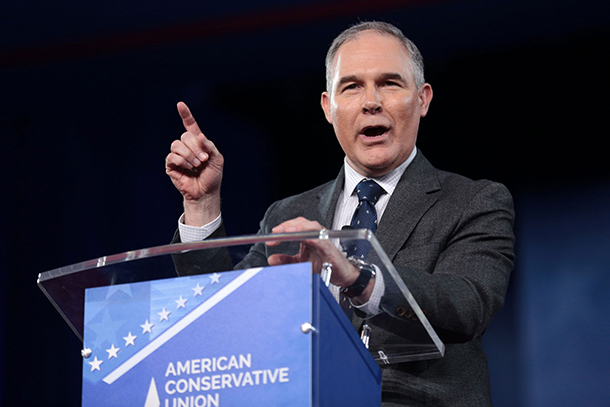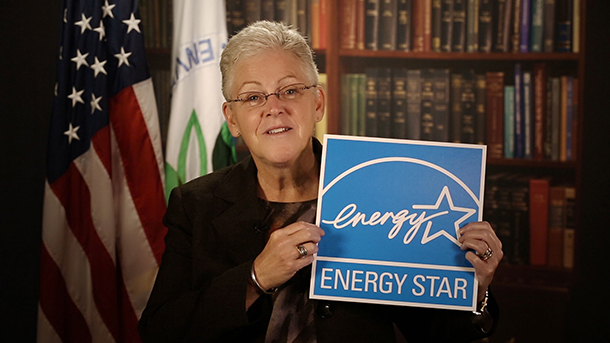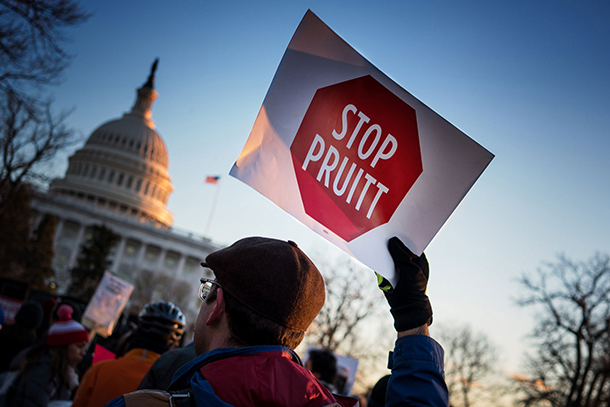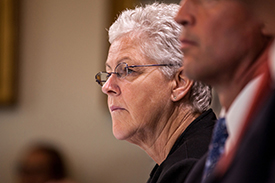Environmental Protection on the Chopping Block
Air Date: Week of March 17, 2017

EPA Administrator Scott Pruitt recently said he does not believe carbon dioxide is a primary driver of global warming, contradicting the EPA’s own website. (Photo: Gage Skidmore, Flickr CC BY-SA 2.0)
Gina McCarthy, former administrator of the US Environmental Protection Agency , says deep budget cuts and staff reductions would damage the agency’s mission to protect the public with sound science, and most harm communities that need the greatest environmental protection. McCarthy tells host Steve Curwood why she believes EPA’s Obama-era climate regulations are on firm legal footing, and why dozens of programs slated for gutting or total elimination by the Trump Administration are essential to ensure clean air and water for all Americans. They discuss fuel economy standards, the future of the Paris Climate Agreement and why environmental justice is a vital EPA program that protects the most vulnerable communities.
Transcript
CURWOOD: From PRI, and the Jennifer and Ted Stanley Studios at the University of Massachusetts Boston, this is Living on Earth. I’m Steve Curwood. The US Environmental Protection Agency that shaped the Clean Power Plan and vehicle efficiency standards to address climate change for the Obama Administration is now being led by a declared climate skeptic. Incoming EPA Administrator Scott Pruitt recently stated that he does not believe carbon dioxide is a primary contributor to climate change. Gina McCarthy preceded Mr. Pruitt as EPA Administrator and was a major architect of the Obama air pollution rules, and she joins me now.
Gina, welcome back to Living on Earth.
MCCARTHY: Thank you. It's great be back again.
CURWOOD: So, let's cut right to the chase. Your successor Scott Pruitt is a protégé of Senator James Inhofe from Oklahoma, who famously went out on the Senate floor with a snowball saying there is no such thing as global warming. In fact, Administrator Pruitt has also said recently that it's very doubtful that carbon dioxide contributes to climate change. How do you feel about that in light of science and present politics?
MCCARTHY: Well, I think as a person who ran the Environmental Protection Agency and understands it as a science agency, we do public health protections based on science. It's a little disconcerting to have people question what is perhaps one of the most robust records that we have available to us about what's happening in the world today, especially given the tremendous consequences of our changing climate.
CURWOOD: So, the Trump administration is talking about slashing the EPA budget. You hear different numbers, 20 percent, 30 percent. How could they do that and what programs you think would suffer as a result?
MCCARTHY: Well, we saw the fact that the pass back that was prepared by the president looked at not only making overwhelming cuts, but significant cuts to the scientists in the agency. We're talking about potentially 42 percent fewer scientists at EPA. And that's going to hinder everything we do. That is our sort of framing for what Congress told us to do, not to shoot from the hip but to make really sound public health decisions based on science. We also saw that 38 programs were slashed in their entirety, and it's also focused on eliminating voluntary programs like EnergyStar.
So, if this administration doesn't want to support the science that underpins our rules then, you're undermining the authority and responsibility that Congress gave to that agency, and if we can't even work with businesses on a voluntary basis, do they really think that the environment is okey-dokey know, that we're finished, we can put a checkmark on that and just sort of cruise for the rest of the next four years? It's discouraging that EPA as a science and public health agency isn't being given the respect that it is due as a bipartisan opportunity to protect some of our core values like clean air, clean water and a safe and stable planet. That's why people created EPA. That's why we've been working for 47 years for the American people and our kids. I don't know why we would want to think that our job is done. It is far from it.

Above, former EPA Administrator Gina McCarthy holds up the Energy Star logo. Energy Star, created in the last year of President George H.W. Bush’s term, is one of more than fifty EPA programs that President Trump’s budget outline proposes to eliminate entirely. (Photo: EPA, public domain)
CURWOOD: In terms of the programs that we might lose from the EPA with these projected cuts - you mention the EnergyStar program – but what are some of the others?
MCCARTHY: Well, one other program would be our brownfields program, and that's a program that's actually essential for environmental justice communities because this program that looks at contaminated properties, tries to provide information to the states and local communities to assess the contamination, figure out how to get it back on the economic rolls again so that they can be invested in, and the jobs can come back.
We are looking at specific research programs as well, significant reduction in our climate affects whether they're voluntary or whether it's about looking at the science that underpins those efforts. It's taking away our ability to fund research in universities that are essential to underpinning our health-based standards setting process.
You know, one of them that baffled me was we have a program that looks at endocrine disruptors, basically chemicals that can significantly impact human beings. Apparently that wasn't worth continuing as well. So, there are some fundamental decisions that are being made by this administration through a budget process that I actually think are worth public input and it's a shame that they're doing it through the budget instead of a direct discussion with the public.
CURWOOD: I recall that Ann Gorsuch came into the EPA appointed by President Reagan. She said she was going to cut 25 percent, and she was gone within two years, and some of her associates had some legal problems. It feels a little bit like déjà vu.
MCCARTHY: Well, you know, we've had a lot of Republican administrations that have come in. I know that that particular administration wasn't very successful, but I've never seen one quite like this that moves so quickly. Most of the people going in there don't really know the agency. They come in with sort of an objective to really take down our ability to do science well. I just don't know who that benefits and I know there's been a lot of rhetoric during the Trump campaign about EPA and somehow working contrary to the economic interests of this country. I just would like to see where that data is coming from because in my world, growing up in the ’60s, I breathe a lot easier, I know where my drinking water comes from. I understand that my best interest and my family's best interest is being provided for as best we can. Well, at the same time, I know that we are one of the strongest economies in the world. Our GDP has tripled while we have reduced air pollution 70 percent. Where is the damage? Where is the conflict?

Concerned about Scott Pruitt’s potential conflicts of interest as nominee for Environmental Protection Agency Administrator, activists called on tthe Senate to reject Mr. Pruitt in the weeks before his confirmation. (Photo: Lorie Shaull, Flickr CC BY-SA 2.0)
Right now, the fastest growing sector in our economy is the solar industry. That's where the jobs are. Right on the heels of that, wind is really beginning to get so inexpensive that it's competing similar to solar against fossil energy. These are the technologies of the future and the jobs of the future. I hate the idea that we are going to deny what is a robust science record, and we're also going to be sending a signal to our children that maybe that's not the place to go for a job.
CURWOOD: So, goodbye, American leadership. Hello, Germany and China.
MCCARTHY: Well, China has made that very clear. [LAUGHS] You know, at Davos, at the world economic forum, when people started bemoaning the fact that the US government appeared to be backtracking on things like climate and the investments that we would need for the future, China put up their hands and with that they put billions of dollars up for renewables and they took their hand down when it came to building significantly more coal units to generate electricity there. So, they sent an immediate signal that if there is a void and the US doesn't want to play, they are more than willing to fill that void and get those advantages.
CURWOOD: So, let's talk regulation. President Trump is directing to Mr. Pruitt to revise or rescind the Clean Power Plan that was finally promulgated in 2015. Now, considering that the EPA is required by law and Supreme Court decision to regulate greenhouse gas emissions, how likely is it that the Trump administration can walk back the Clean Power Plan?
MCCARTHY: Well, I have to wait and see what his executive order says, but I think he's made it clear that he’s interested in pulling back in the Clean Power Plan. And let me make one point very clear. His only vehicle to address the Clean Power Plan is an executive order telling the agency to take specific actions, but there is no way in which an executive order can trump a rule. It has to be done through a rulemaking process that requires significant public input. It requires an evidentiary record, a record of the science, a record of the facts. We have developed a great record of science and data to support the Clean Power Plan and our other rules.
We have actually won in the very vast majority of cases when those rules have been tested. Let me tell you, 90 percent over the last three years in which we have taken action under the Clean Air Act on climate, we have won in its entirety, and the ones that we have lost up are narrow things that we needed to take care of. So I am confident that we have done it in accordance with the law and with science. If this administration wants to pull back on that, they're going have to figure out how to say, “Whoops, I made a mistake, I'm going have to redo this,” and expect that that redo is going to take the place of a well done, extremely engaging, extremely well thought out outreach program that went with it, so the public could speak. That's going to take a long time, especially if 20 percent of the people have already been shown the door. But the first thing they are going to do is figure out whether or not they can get it out of the hands of the court in the first place.
CURWOOD: And what does that mean?
MCCARTHY: Well, the D.C. Circuit could decide, “I don't want to give it back to the agencies to rethink”. They could say that this is a big rule. “We're ready to issue a decision on it to decide.” Then they're going to have to go back and ask the Supreme Court to do that. The Supreme Court has spoken on climate issues and carbon pollution three times. They have been very clear. They have used words like “robust” for the science in their decisions. So, they kind of know that this is a big deal, and they've sent a signal that they want to rule on it.
CURWOOD: And, as I understand it, many many states have prepared to move forward with the lean Power Plan, that really it’s on its way.
MCCARTHY: Well, the vast majority of states who have sued the EPA are already meeting the targets that we set for 2022, claiming that it was just overwhelmingly difficult and states couldn't do it and it was unreasonable. There is nothing in facts today that indicate that the Clean Power Plan was anything but reasonable and appropriate following the way the clean energy transition is already happening.

President Trump’s proposed budget outline has a 31% cut for the EPA. (Photo: Official White House Photo)
[MUSIC: The Nile Project, “Mulungi Munange” on Jinja, Micheal Baxibu/Steven Sogo, Zambaleta Music ]
CURWOOD: My guest is Gina McCarthy, who just finished her term as Administrator of the EPA. More of our conversation is just ahead. So stay tuned to Living on Earth.
ANNOUNCER: Support for Living on Earth comes from the Gordon and Betty Moore Foundation, and from a friend of Sailors for the Sea, working with boaters to restore ocean health.
[CUTAWAY MUSIC:The Nile Project, “Tenseo” on Jinja, Jorga Mesfin/Mohamed Abozekry/Mamdouh Fawzi, Zambaleta Music]
CURWOOD: It’s Living on Earth, I’m Steve Curwood. We’re back now with former EPA administrator Gina McCarthy. So we're talking on March 15th, and it's the same day that President Trump is in Detroit speaking to automakers who are asking to roll back the automobile efficiency rules that were promulgated during your time at the Environment Protection Agency. Gina, what are your concerns?
MCCARTHY: Well, I understand there's going to be a new executive order, so I'll have to see what that says, but, you know, we worked with the automakers - all of them, the big three and in the US and internationally. We worked with the environmental constituents. We worked with California to actually lay out these rules and these specific standards. EPA and the Department of Transportation actually did a rule together to align one national program to manage our relationship with automakers. And so, everybody was involved with this all along, and so it disappoints me if the manufacturers right now are looking to revisit that standard. Frankly, that's going to provide a level of uncertainty for them that we tried to get out of the picture because when you're an automaker, you're projecting what the consumers will want and what the government will require over the course of 10 or 11 years ahead. So, it provides a measure of uncertainty for them which I don't frankly think will be welcome.
CURWOOD: Now, what if the Trump administration goes after what's known as “the endangerment finding.” That is, after Massachusetts sued the EPA, the Supreme Court agreed that carbon dioxide should be considered as a pollutant. Your agency, in fact, the EPA did make the determination that carbon dioxide is a pollutant, and that's the basis of these rules. How likely is it that the EPA could actually roll back the endangerment finding?
MCCARTHY: Well, you know, if they go after the endangerment finding, they're going to take years, and they are simply not going to undo that endangerment finding. It wasn't just looked at initially by the Supreme Court to say, you know, if carbon pollution is a problem, EPA's going to have to consider it under the Clean Air Act as a pollutant and do something about it. We actually had a huge determination that we made an endangerment finding with the light-duty vehicle rule early on in the administration, and that endangerment finding was looked at all the way to the Supreme Court. They did not overturn that, and every time we've done a rule related to carbon pollution, we have redone and advanced the discussion of the science on the endangerment finding, and there is more evidence, the farther along we are that the climate is changing and carbon pollution that we generate is the basis for a lot of that change and that it is a danger. So the record’s only gotten stronger. It is one of the most solid decisions that that agency has ever made, so if they want to spend their time looking at the endangerment finding, maybe it'll keep them out of trouble elsewhere.
CURWOOD: Let me ask you about something else. Secretary of State Rex Tillerson has said it would be a good idea for the U.S. to stay in the Paris Climate Agreement. I'm not sure he has a lot of support inside the adminstration for that, but he said that. How would the US be able to uphold what it's promised at the Paris Agreement if the Clean Power Plan goes away, if automobile efficiency standards are made more lax?
MCCARTHY: Well, I think the US over the past decade or so, we have shown a tremendous commitment to address climate change, and as a result, you know, for a developed country our CO2 emissions have gone down, relatively speaking, more than any other developed country. And so I do think that other countries recognize that the politics have changed in this country, and they talked about that in Morocco and they talked about it in Davos and other places, and they've understood that the US may not make a lot of progress over the next few years.

Former EPA Administrator Gina McCarthy worked at the agency for all eight years of Obama’s two terms, serving as Administrator during the last four. (Photo: Chesapeake Bay Program, Flickr CC BY-NC 2.0)
Paris was a breakthrough in so many different ways. It was a breakthrough to have every country recognize that they can put something on the table moving forward. It was a breakthrough to get better accountability mechanisms, to share information, to enable developing countries to understand new technology choices that are available to them. It would be discouraging if what the US did was not only go on the sidelines, but send a signal to those developing countries that one of the two biggest polluters in the world have decided to take a little bit of a break.
CURWOOD: So, I noticed that Mustafa Ali who's been running the environmental justice program at EPA has resigned. How important is the EPA's environmental justice office? What will America lose buy him leaving and eliminating that office?
MCCARTHY: I think what we have recognized is that, while we've made tremendous improvement nationally, there are a number of communities that have been left behind. There is a disinvestment now in infrastructure that is startling, and I think I don't need to say a whole lot more than Flint, Michigan, to remind people that there are people living in poverty that right now don't have access to clean water, and when someone says that to me, I think I'm not in the United States of America anymore, but I'm in a developing world that’s struggling. Well, we're not struggling. This country is wealthy compared to others. We should not leave people behind, so when you see someone like Mustafa Ali who has been with the agency for decades, that was my environmental justice adviser, who didn't go into communities and say, "I’m going to tell you what to do.” He went into communities and said, "What do you need to move forward. How do we help bring economic vitality through here by cleaning up sites that are now contaminated, that make them ready for jobs and economic growth?" When we have a person like that decide that he can't make progress moving forward, then it's disturbing to me, and I am tremendously disappointed that that is one of the offices and one of the efforts that this administration is apparently divesting itself off.
CURWOOD: Gina, you gave eight years of your life to the federal government serving at the Environmental Protection Agency, the last four at the very top. I imagine it’s really devastating for you to see what's going on there, and what do you hear from your former colleagues about morale?
MCCARTHY: Well, I'm trying not to have conversations with them, and they are certainly not calling me because in the current atmospheric, it wouldn't be healthy for them at this point. But, I know these people. There are 15,000 incredibly talented people who are so dedicated to their public health mission and their interest in protecting the environment and most of them have lived through changes in administrations and understand that policies change. I think the difficulty here is that it's not just a swing in policy, but there's a really serious question as to whether or not this administration actually cares about the mission of this agency. So I can only imagine that they must be tremendously concerned about that.
CURWOOD: Gina McCarthy is the former Administrator of the United States Environmental Protection Agency and now a fellow at the Harvard T.H. Chan school of Public Health and the Kennedy School's Institute of Politics. Administrator McCarthy, thanks so much for taking the time with us today.
MCCARTHY: It was great, and thanks for letting me speak to these issues. They are important, and I appreciate you taking an interest in them.
Links
The Washington Post: “Trump’s budget takes a sledgehammer to the EPA”
The Guardian: “EPA head Scott Pruitt denies that carbon dioxide causes global warming”
Reuters: “Trump seeks input from U.S. energy companies on Paris climate pact”
The Hill: “Trump appointee steps down at EPA”
Living on Earth wants to hear from you!
Living on Earth
62 Calef Highway, Suite 212
Lee, NH 03861
Telephone: 617-287-4121
E-mail: comments@loe.org
Newsletter [Click here]
Donate to Living on Earth!
Living on Earth is an independent media program and relies entirely on contributions from listeners and institutions supporting public service. Please donate now to preserve an independent environmental voice.
NewsletterLiving on Earth offers a weekly delivery of the show's rundown to your mailbox. Sign up for our newsletter today!
 Sailors For The Sea: Be the change you want to sea.
Sailors For The Sea: Be the change you want to sea.
 The Grantham Foundation for the Protection of the Environment: Committed to protecting and improving the health of the global environment.
The Grantham Foundation for the Protection of the Environment: Committed to protecting and improving the health of the global environment.
 Contribute to Living on Earth and receive, as our gift to you, an archival print of one of Mark Seth Lender's extraordinary wildlife photographs. Follow the link to see Mark's current collection of photographs.
Contribute to Living on Earth and receive, as our gift to you, an archival print of one of Mark Seth Lender's extraordinary wildlife photographs. Follow the link to see Mark's current collection of photographs.
 Buy a signed copy of Mark Seth Lender's book Smeagull the Seagull & support Living on Earth
Buy a signed copy of Mark Seth Lender's book Smeagull the Seagull & support Living on Earth

